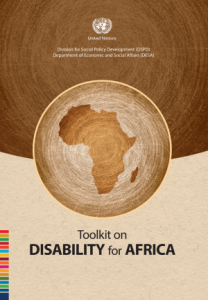The focus of the United Nations on disability issues shifted in the late 1950s from a welfare perspective to one of social welfare. A reevaluation of policy in the 1960s led to de-institutionalization and spurred a demand for fuller participation by persons with disabilities in an integrated society. Operational activities in the field of disability changed through implementation of various United Nations programmes on prevention and rehabilitation. Technical advice was offered to Governments through advisory missions, personnel training workshops, and the establishment or improvement of demonstration centres.
Information was exchanged through study groups, as well as teaching fellowships and scholarships.
A public information campaign was launched by the United Nations through regular distribution of publications in the newly emerging field of disability policy. The first of a set of works entitled Rehabilitation of the Handicapped was published in the Social Welfare Information series. This special issue outlined the international programme for the rehabilitation of persons with disabilities and highlighted programmes, books and films on rehabilitation. In 1956, the International Social Service Review was founded, one of whose objectives was to raise awareness of disability issues and emphasize rehabilitation programmes around the world.
While early United Nations activities supported the rights of persons with disabilities to receive welfare and public services, initially little attention was paid to societal obstacles that might be created by those goals. Starting in the late 1960s, attitudes began shifting towards a new social model for dealing with disability.
The Declaration on Social Progress and Development, adopted on 11 December 1969, affirmed the fundamental freedoms and principles set forth in the Charter of the United Nations and emphasized the need to protect the rights and welfare of persons with disabilities.




